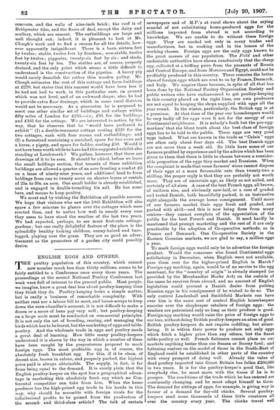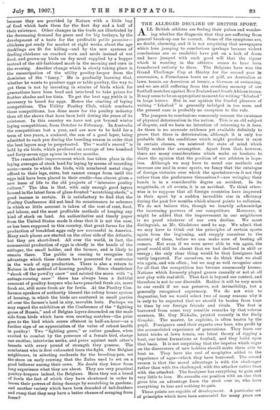ENGLISH EGGS AND OTHERS.
THE poultry population of this country, which cannot now number much less than thirty millions, seems to be fairly entitled to a Conference once every three years. The proceedings at the second National Poultry Conference last week were full of interest to the general public. Most people, we imagine, know a great deal less about poultry-keeping than they think they do. Poultry-keeping looks a simple matter, but is really a business of remarkable complexity. With neither rent nor a labour bill to meet, and house-scraps to keep down the corn-chandler's account, it is not difficult to make a dozen or a score of hens pay very well ; but poultry-keeping on a large scale must be conducted on commercial principles. It is not only the art of breeding, rearing, and managing the birds which has to be learnt, but the marketing of eggs and table- poultry. And the wholesale trade in eggs and poultry needs a great deal of learning. How little many poultry-keepers understand it is shown by the way in which a number of them have been caught by the preposterous proposal to mark foreign eggs. The most profitable egg is, of course, the absolutely fresh breakfast egg. For this, if it be clean, of decent size, brown in colour, and properly packed, the highest price paid is always obtainable. The supply, in fact, is far from being equal to the demand. It is surely plain that the English poultry-keeper on the spot has a geographical advan- tage in marketing this absolutely fresh egg which no Con- tinental competitor can take from him. When the home producer has the high-priced egg trade in his hands in this way, why should he scramble with foreign rivals for the infinitesimal profits to be gained from the production of the second- and third-class article ? The talk of certain
newspapers and of M.P.'s at rural shows about the crying scandal of not substituting home-produced eggs for the millions imported from abroad is not according to knowledge. We are unable to do without these foreign eggs. They are needed not only in many trades and manufactures, but in cooking and in the homes of the working classes. Foreign eggs are the only eggs known to the great masses of our population. The Field and other undeniable authorities have shown conclusively that the cheap egg, collected at a trifling price from the peasants of Russia and Central Europe, and from Morocco and Egypt, could not be profitably produced in this country. There remains the better class of foreign eggs which are sent to us by France, Denmark, and Italy. We require these because, in spite of all that has been done by the National Poultry Organisation Society and public writers who have endeavoured to get poultry-keeping in this country placed on the right lines, our own producers are not equal to keeping the shops supplied with eggs all the year round. In the winter, particularly, the British egg is at a premium. At that time of the year our housekeepers would be very badly off for eggs were it not for the energy of our Continental neighbours. It is nobody's fault but the pro-egg- markers' that the blunt truth about the best class of foreign eggs has to be told to the public. These eggs are very good eggs indeed. What are known in the trade as "Calais" eggs are often only about four days old. The best Danish eggs are not more than a week old. So little have some of our farmers profited by experience and by the advice which has been
e to them that there is little to choose between a consider-
able proportion of the eggs they market and Russians. When the complaint is made that some farmers' wives cannot dispose of their eggs at a more favourable rate than twenty-two a shilling, the proper reply is that they are probably not worth more. They are of uncertain age, as likely as not soiled, and certainly of all sizes. A case of the best French eggs, all brown, of uniform size, and obviously new-laid, or a case of graded and tested Danish, both beautifully packed, is an instrective sight alongside the average home consignment. Until more of our farmers market their eggs fresh and graded, and packed with skill—and this is now being done from many centres—they cannot complain of the appreciation of the
public for the best French and Danish. It need hardly be
mentioned that prompt marketing and the rest of it are only practicable by the adoption of Co-operative methods, as in France and Denmark. One Co-operative Society in the Eastern Counties markets, we are glad to say, a million eggs a year.
To mark foreign eggs would only be to advertise the foreign product. Would the consumer who found Continental eggs satisfactory in December, when English were not available, pass them over for the higher-priced English in March ? Foreign-egg marking, again, would be of no service to the egg merchant, for the "country of origin" is already stamped (as provided by the Merchandise Marks Act) on the outside of the cases he receives from abroad, and no amount of English legislation could prevent a Danish dealer from putting Russian eggs in his consignment if he wished to do so. The only control Leadenball and Smithfield Markets can have over him is the same sort of control English housekeepers exercise over the shopkeeper retailers of foreign eggs: the vendors are patronised only so long as their produce is good. Foreign-egg marking would raise the price of foreign eggs to our loss, without doing British poultry-keepers an atom of good. British poultry-keepers do not require coddling, but stimu- lating. It is within their power to produce not only eggs which fetch a higher price than any others, but the finest table-poultry as well. French fatteners cannot place on our markets anything better than our Sussex or Surrey fowl; and fattening centres on the model of those in the South-East of England could be established in other parts of the country with every prospect of doing well. Already the value of dead poultry imported into Great Britain has fallen 2200,000 in two years. It is for the poultry-keeper's good that, like everybody else, he must move with the times if he is to prosper. The conditions of the trade which he has entered are continually changing, and he must adapt himself to them. The demand for sittings of eggs, for example, is giving way in favour of a demand for day-old chicks. Several poultry- keepers send some thousands of these little creatures all over the country every year. The chicks travel well
because they are provided by Nature with a little bag of food which lasts them for the first day and a half of their existence. Other changes in the trade are illustrated by the decreasing demand for geese and for big turkeys, by the development of a taste for the profitable petits poussins- chickens got ready for market at eight weeks, about the age Aucklings are fit for killing—and by the new systems of feeding chickens on cracked corn and seeds instead of wet food, and grown-up birds on dry meal supplied by a hopper instead of the old-fashioned mash in the morning and corn in the evening. Another change which is slowly taking place is the emancipation of the utility poultry-keeper from the dominion of the "fancy." He is gradually learning that, whether be wants to produce eggs or table-poultry, the way to get them is not by investing in strains of birds which for generations have been bred and interbred to take prizes for feather shades and toe tints. To get the best egg yields it is necessary to breed for eggs. Hence the starting of laying competitions. The Utility Poultry Club, which conducts these competitions, has done more for the poultry industry than all the shows that have been held during the years of its existence. In this country we have not got beyond winter laying competitions, from October to February. In Australia the competitions last a year, and are now to be held for a term of two years, a cockerel, the son of a good layer, being admitted to each pen during the breeding season in order that the best layers may be perpetuated. The "world's record" is held by six birds, which produced an average of two hundred and forty-seven eggs apiece in twelve months.
The remarkable improvement which has taken place in the laying averages of stock bred for laying by means of recording nests—nests to which the birds, with numbered metal rings affixed to their legs, enter, but cannot escape from until the eggs laid have been placed to their credit—has almost given a new lease of life to the old projects of "intensive poultry culture." The idea is that, with only enough good layers housed in the latest form of glass-fronted "scratching sheds," a good income is certain. It is satisfactory to find that the Poultry Conference did not lend its countenance to schemes in which so little account is taken of the cost of rent, food, and labour, and the most profitable methods of keeping any kind of stock on land. An authoritative and timely paper from the United States made it clear that it is not the case, as has been supposed in this country, that great farms for the production of breakfast eggs only are successful in America. Many such places are started on the other side of the Atlantic, but they are short-lived. All over the world, in fact, the commercial production of eggs is chiefly in the hands of the cottager, the small holder, and the farmer, and is likely to remain there. The public is coming to recognise the advantage which these classes have possessed for centuries in the work of egg production. There is also a return to Nature in the method of housing poultry. Since chanticleer "shook off the powirry snow" and saluted the morn with " a cottage-rousing crow" there has always been a faithful remnant of poultry-keepers who have preached fresh air, more fresh air, still more fresh air for fowls. At the Poultry Con- ference speakers of authority blessed the colony house system of housing, in which the birds are scattered in small parties all over the farmer's land in airy, movable huts. Perhaps we may regard the exhibition at the Conference of the "fighting goose of Russia," and of Belgian layers descended on the male side from birds which have won crowing matches—the prize goes to the bird which crows oftenest in half-an-hour—as a further sign of an appreciation of the value of robust health in poultry! Two "fighting geese," or rather ganders, when excited to combat by the presence of a female bird, charge one another, intertwine necks, and press against each other's breasts with every pound of strength they possess. The combatant who is first exhausted loses the fight. Our Belgian neighbours, in selecting cockerels for the breeding-pen, set the store on early crowing that the Zulus used to set on a good bellower among their cows. No doubt they know from long experience what they are about. They are very practical Poultry-keepers indeed, the Belgians. Have they not a breed of fowls the feet of which they have shortened in order to lessen their powers of doing damage by scratching in gardens; and another variety which have been denuded of tail-feathers and rump that they may have a better chance of escaping from foxes







































 Previous page
Previous page